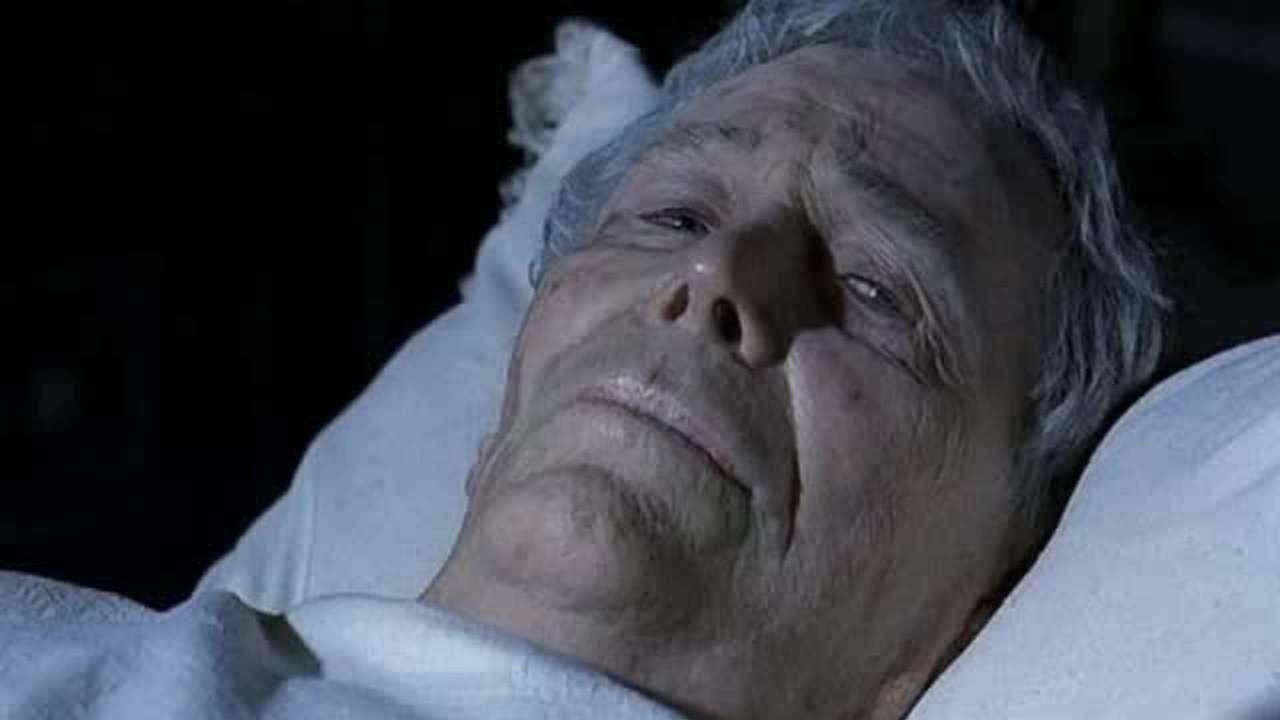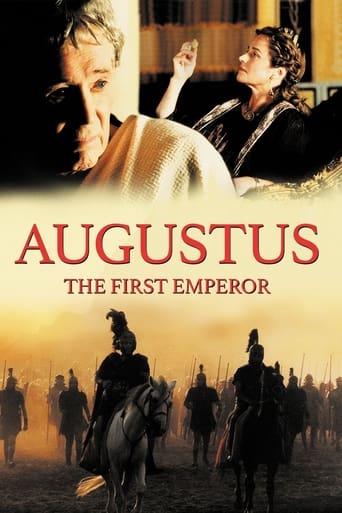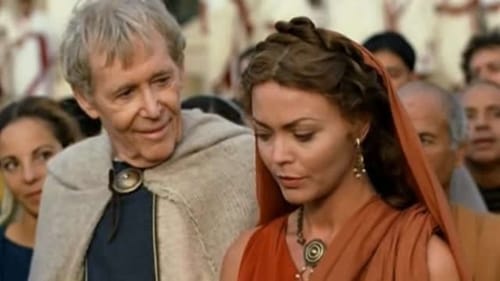




Nice effects though.
Absolutely brilliant
The tone of this movie is interesting -- the stakes are both dramatic and high, but it's balanced with a lot of fun, tongue and cheek dialogue.
View MoreI think this is a new genre that they're all sort of working their way through it and haven't got all the kinks worked out yet but it's a genre that works for me.
View MoreThis movie is based on the life and achievements of the first emperor of Rome, Augustus, the adopted son of Julius Caesar. Augustus, a fascinating and controversial man, may have been the most important figure in Roman history. Through his long life (63 B.C. - A.D. 14) and deeds, the failing Republic became an empire which endured for centuries, thus preserving and advancing the civilization of the day.Particularly noteworthy is an outstanding performance by Peter O'Tool as Augustus, possibly his best, both captivating and very enjoyable indeed. The film brought to life the struggle that civilization faced to survive against threats from all sides. Peter O'Tool masterfully uses a full repertoire of emotions to tell the story of Augustus as he seeks to preserve his Rome.
View MoreAUGUSTUS (also known as IMPERIUM: AUGUSTUS) is a film made for television, which could explain how its three and one half hour length would be spread over at least three nights. This movie was made with an obvious plentiful budget, sponsored by the Italian government and US filmmakers, and the result is a complex and nicely detailed biographical study of the first Emperor of Rome, Augustus Caesar, the man whose reign spanned the BC/AD time frame with all the attendant changes in world geography and history and religious orders. It was a time of Rome's greatness and a time of Rome's disintegration.Writer Eric Lerner and Director Roger Young wisely elected to tell this tale as a series of flashbacks as recalled by the aged, dying Augustus brilliantly portrayed by Peter O'Toole. His very presence gives the project credibility and dignity and helps the viewer forgive any of the many shortcomings that dot this epic. Augustus is attended by his wife Livia (again, a wise choice in casting the always superb Charlotte Rampling to bring this odd woman to life). With some adroit camera superimpositions of the old Augustus' face the story goes back in time to the death of Julius Caesar, the one who appointed the young Augustus (Benjamin Sadler) to be his successor. It is 42 BC and the young Augustus, together with his sidekicks Agrippa (Ken Duken) and Maecenas (Russell Barr in a foppish turn), struggle through the Senate, the noblemen, and the poor people of Rome who all have been ignored during Julius Caesar's infamous wars to expand the Empire. The complicated lineage to the 'throne' of Rome is manipulated by Julia (Vittoria Belvedere), Marc Antony (Massimo Ghini), Tiberius (Michele Bevilacqua) and Iullus (Juan Diego Botto), the son of Marc Antony, among many others.Along the way we meet Cleopatra (Anne Valle) and Cicero (Gottfried John) and many of the other casually dropped names of Roman history. Though the names and the changes of who is ruling who at any one time can be confusing to even the most astute Roman historian, the writer and director do their best to make this story flow so that it all is of a piece. The acting is superb for the leads, adequate for the secondary roles, and the camera work manages to make the numerous battlefield sequences seem cogent.In the end is the beginning: the death of Augustus. A casual mention is made that during his reign there was born in the land of Judea a child whose name was Jesus...and suddenly the whole lengthy film gathers more meaning. This is a fine overview of Roman history and civilization and thanks to the fine work by Peter O'Toole and Charlotte Rampling the result is very satisfying. Grady Harp
View MoreThe above comments are too harsh, but the film is by no means great.The bad parts first. The CGI - if thats what it is - is very poor for audiences raised on "Gladiator" and the rest of the sword-and-sandal epics, to say nothing of contemporary TV productions like Channel Four's "The Ancient Egyptians". All of the battle scenes suffer as a result, and this is worsened by some shots of legionaries being hit by arrows and pila that are utterly laughable - one soldier can be seen to pull the spear into his body, others are already grabbing the part the arrow hits before it hits. Moreover, the battles they represent are meaningless, as they neglect to show either Phillipi or Actium in any detail that could do them justice.The script is a bizarre mishmash of historical accuracy and modern elements, the most obvious being the character of Maecenas, brought in for some reason to be both comic relief and "the only gay in the village". The continual harping on about Rome also grates somewhat, though this tends to die out towards the end; for that matter the original insistence that Octavian and Agrippa were "country boys" is incorrect - Octavian's father had been praetor.The filming location - in Bizerte - is also very obviously not Italy, and since a recurring element of the film is the activity in and around the forum, this is noticeable more than it would have been if the activity was focused in the senate.Despite all that, there is still an OK film lurking beneath the surface. Peter O'Toole does a good - if bored - turn as the elderly Augustus, Livia (who the historical sources believe was as manipulative as she is portrayed here Marcus - Caligula was to call her "Ulysses in petticoats") is played well by both actresses, with exactly the right amount of malice; Michele Bevilacqua's Tiberius is suitably reluctant to assume the burden of the Empire and Julia, as well as nagged by Livia (though he shunned Julia, and appealed against her banishment - so the rape scene was unjustified).Despite what Marcus wrote above, the treatment of Julia in this film - aside from the rape - is justified by the extant evidence, she was banished for adultery, after a complaint by her father using a law he had brought about with Iullus.Its also much more historically accurate than most films - it sticks closely to Suetonius's "Life of the Deified Augustus" (aside from the gripes mentioned above) and far better than more expensive films (King Arthur bow your head in shame), and is well worth watching for anyone who is prepared to accept some bizarre script moments in order to learn something of history.
View MoreWhat can I say about this? Such a big Prestige-Production - but in the End? Wasted Time, wasted Money.This work a disaster is historically seen. Only some examples:* Augustus often is named 'Gaius' - his First name (Pronomen). But the old Romans don't used this Name. Correct would be the Surname (Nomen Gentile and Cognomen) or the 'Octavian', 'Caesar', 'Augustus'.* Livia was shown as tyrannic Wife. But this historically wrong.* Iulia was shown as nice young woman - but she wasn't one. Adultery and (maybe?) Prostitution and arrogant behavior was the cause of her banishing.* She wasn't at the dying bed of her Father. She never was allowed to leave her banishing. And she was at this time around 50 years old! Not as young as she was shown. In the same Year Augustus died she committed suicide, because Tiberius stopped giving her a Pension.* Augustus was much more scruplesless then in this Movie shown. But Author and Director seems to believe Augustus' own 'Res Gestae'.What remains? Historically extremely doubtful, bad acting, bad built and equipment - 2 Points out of 10 - one for Peter O'Toole.
View More